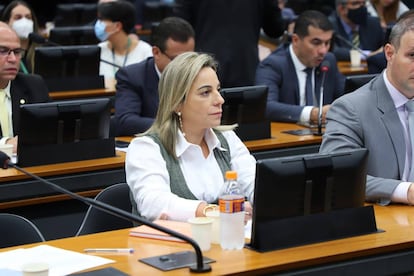Brazil’s armed and security forces line up to run the country
Police officer and congresswoman Katia Sastre, who rose to fame in 2018 after shooting a robber dead, embodies the growing presence of uniformed men and women in politics. More than 1,800 of them are running in the next election


Despite being off duty, former police officer Katia Sastre took a last-minute decision to put a gun in her purse before taking one of her daughters to a school party in the city of Suzano in Sâo Paulo. As Sastre and her daughter joined the crowd of mothers and girls at the school gates, a man carrying a .38 revolver materialized out of the blue. Without missing a beat, Sastre reached into her purse, pulled out her pistol and fired three shots, killing the aggressor. The images from a security camera went viral as Brazil prepared for the 2018 elections. And Sastre’s new-found fame catapulted her to Congress as she became swept up in the wave of Bolsonarism. Now, Sastre is campaigning to be re-elected in the elections on October 2 when Luiz Inácio Lula da Silva and current president, Jair Bolsonaro, will compete for the presidency.
Along with a raft of generals-turned-ministers, Bolsonaro’s Brazil has seen a proliferation of congressmen and women who once wore badges and wielded guns. Sastre, 46, is just one of many drawn from the military and security forces. The phenomenon pre-dates Bolsonaro, but with his army credentials, the ultra-right-winger has fueled the trend. Besides Sastre, 115 uniformed officers were elected in the last elections, two of whom were voted in as state governors.
“My agenda over the past four years has been public safety,” Sastre tells EL PAÍS. “I have invested [public money] in programs to get children off the street so they don’t get involved in drugs, programs to strengthen families, and to combat domestic violence, not only against women, but also children... And to improve how we are armed, because right now organized crime has better weapons than public institutions,” she explains.
Make no mistake, Sastre is absolutely on the same page as the leader of Brazil’s extreme right: “I am totally right-wing and conservative, and I support President Bolsonaro,” she states categorically.

That day, outside the school gates, was not the first time this mother of two had shot a suspect. “I’ve been involved in other similar incidents, but never on a day off and with my daughter present,” says Sastre who spent 20 years on the force. “I can’t miss the shot, because it will hit a child,” she says. “I can’t shoot from a distance because I might hit a passerby; you have to choose the right moment to pull out the gun because he has his finger on the trigger and can kill you.” That day, her victim became another statistic among the thousands of Brazilians who die every year in face-offs with the police.
The debate on insecurity was raging when the images of Sastre gunning down the 21-year-old went viral in May 2018. She was subsequently invited to run in the elections that took place five months later. “I resisted for a bit, until I understood that I could better help people from Congress,” she says.
Bolsonaro himself built his long political career on the defense of the corporate interests of those in the military, having left the armed forces through the back door after threatening to plant a bomb to protest against their meager salaries. It was some years before his focus included the security forces too – a smart move because police officers, military personnel and their families constitute a huge voting pool. According to estimates by the Brazilian Public Security Forum (FBSP) published by Piauí magazine, there are around five million police and military personnel, including retirees. That figure would rise to around 18 million if their families were included – in a country of 210 million.
According to the head of the FBSP, Renato de Lima, “Bolsonaro ends up using the police to build his power project.” The shift of members of the security forces into politics is due to both a structural issue and a crossroads, he says, explaining that, on the one hand, the working conditions are inhuman, the career is demotivating and there are many suicides. Police associations have gained traction over the years, and their leaders have begun to grasp that their positions can be a steppingstone to a political career. And that coincides with the strengthening of conservative politics and with Bolsonaro and his “I will solve security” and “the police are heroes” discourse. There is the added advantage that, unlike judges, they don’t have to give up their careers. If they leave politics, they can go back to the uniform, badge and gun.

These different scenarios have brought about a considerable increase in the number of uniformed elected officials. If in 2010 there were 27, in 2018, that figure soared to 115. Now, together with Sastre, who seeks to regain her seat, more than 1,800 agents and military personnel are running for the October 2 elections when, as well as electing the country’s president, Brazilians will choose members of Congress, regional governments and state governors. That is 25% more candidates from the military and police sector than four years ago. De Lima, from the Security Forum, predicts that such a rise will mean many of these candidates competing against each other, which will split the vote. That, in turn, makes it likely that the number of elected candidates from the sector will fall.
Practically all the military and police candidates are aligned with the right, with only 3% on the left – the Workers’ Party (PT) has also focused on police officers, for example, with the candidacy of Major Denice Santiago for mayor of Salvador de Bahia. She has been fighting for more action on domestic violence and on building a more humane police force. “The PT takes advantage of the phenomenon, puts up candidates, but does not have an alternative discourse on public security,” says FBSP’s Renato de Lima. One fact: the State of Bahia, where the PT has been governing for years, is second only to Rio de Janeiro when it comes to the use of lethal police force.
Tu suscripción se está usando en otro dispositivo
¿Quieres añadir otro usuario a tu suscripción?
Si continúas leyendo en este dispositivo, no se podrá leer en el otro.
FlechaTu suscripción se está usando en otro dispositivo y solo puedes acceder a EL PAÍS desde un dispositivo a la vez.
Si quieres compartir tu cuenta, cambia tu suscripción a la modalidad Premium, así podrás añadir otro usuario. Cada uno accederá con su propia cuenta de email, lo que os permitirá personalizar vuestra experiencia en EL PAÍS.
¿Tienes una suscripción de empresa? Accede aquí para contratar más cuentas.
En el caso de no saber quién está usando tu cuenta, te recomendamos cambiar tu contraseña aquí.
Si decides continuar compartiendo tu cuenta, este mensaje se mostrará en tu dispositivo y en el de la otra persona que está usando tu cuenta de forma indefinida, afectando a tu experiencia de lectura. Puedes consultar aquí los términos y condiciones de la suscripción digital.








































